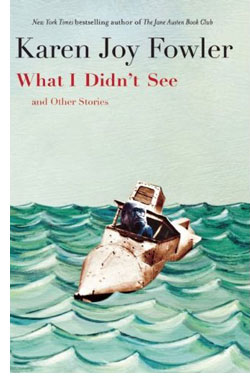 |
 |
 Karen Joy Fowler
Karen Joy Fowler
What I Didn't See
Reviewed by: Rick Kleffel © 2010
Small Beer Press
USA Trade Hardcover, First Edition
ISBN 978-1-931-52068-3
Publication Date: 10-01-2010
311 pages, $24
Date Reviewed: 10-16-2010
Index:
General Fiction
Fantasy
Horror
The power of the short story is the power of myth.
The best short stories touch readers at a bedrock level, short-circuiting our perceptions of the everyday and the trivial. They bypass current affairs in favor of the timeless currents that underlie not just our culture, but all culture. The story-length is important. We need that confined space to heighten our sense of everything. Short stories can, at their best, create a unique reading experience.
Karen Joy Fowler is an accomplished novelist, but she is also that rare writer who can match the power of her novels with the power of her short stories. She works in the world of myth with great ease. We feel, reading her stories, that we are in our world, but some portion of it that connects vitally with everything else. What happens here is gripping, important, compelling, and often terrifying. Her new collection of stories, 'What I Didn't See' offers readers perfect renderings of a New American Mythos.
The book starts off unforgettably with "The Pelican Bar." Norah is an average, if trouble-prone teen celebrating her birthday. Her parents give her an unexpectedly nice party, and afterwards, she sneaks in two friends and they all have magic mushrooms. When she wakes up the next morning, still hallucinating, she is being borne off to a boarding school unlike anything you've ever experienced in fiction. Norah's trials there are the stuff of nightmare, but the sort of nightmare we can all too easily imagine. This story won The Shirley Jackson Award this year, and it is easy to understand why; it has all the power and menace of "The Lottery."
In this story, and others, including "The Last Worders," a more genial, but still creepy tale of two women traveling in "San Margais," Fowler expertly deploys a sense of dislocation. The world feels both familiar in the details that Fowler beautifully evokes (a set of stairs carved into the side of a cliff, a city with a famous dispute between two conflicting personalities) but unfamiliar as well, since all these details, which feel real, aren't in our history. For all the friendly camaraderie the two women in "The Last Worders" share, there's a pervasive sense of unease.
Two of the stories center around John Wilkes Booth; "Booth's Ghost," a poignant vision of Edwin Booth, (published here for the first time), and "Standing Room Only." Both are detailed with bits of history that engage and immerse the reader without overwhelming. Though we know the events of that night well, Fowler finds stories around them that are more compelling. It's a fascinating, low-key demonstration of her powers as a writer .
"The Marianas Islands" finds Fowler addressing family matters in a story that is amazingly imaginative even as it has the down-to-earth feel of kitchen-table fables. It's a nice counterbalance to the families we meet in the "Familiar Birds." Their kitchen tables are not such happy places.
Fairy tale motifs crop up often in Fowler's work. Both "The Dark" and "King Rat" play with the Pied Piper. "The Dark" takes readers to the tunnels in Vietnam, while "King Rat" explores the bowels of a science lab in a modern university. Fowler is attentive to the unsettling, unpleasant vibe of her inspiration, but finds her own evocative atmosphere. "The Dark" is best read in the light, while "King Rat" might fare well by a fireside.
"Halfway People" is a perfectly wrought example of the 21st century fairy tale, complete with kings, swans, transformations and economic despair. Fowler's characters ring true and themselves transform the magical elements into unfamiliar aspects of the mundane. The real magic here is in the powerful emotional arc of the story.
Fowler also uses the short story form to engage in conversations with other writers; Agatha Christie meets the mummy myth in "Private Grave 9," with a delightful but chilling resolution. "What I Didn't See" is Fowler's answer to "The Women Men Don't See," by Alice Sheldon, who wrote as James Tiptree Jr. In it, Fowler once again employs her powers as a writer of historical fiction, evoking the awe of early African explorations and the horror of easy exploitation. It's a good choice for the title story, as complex and compelling as any piece of short fiction. This is the sort of collection that gets regularly re-read, because Fowler's stories manage to retain their mystery and power even if you know what happens in the plot. These stories remain grounded in the reading experience, and make that experience consistently and repeatedly rewarding.
|
 |
|
|
 |
| |
Review Archive
All Reviews alphabetized by author.
General Fiction
Non-Genre, general fiction and literature.
Horror
Supernatural fiction, supernatural horror and non-supernatural horror.
Science Fiction
Science fiction, science fantasy, speculative fiction, alternate history.
Fantasy
Fantasy, surrealism and magic realism.
Mystery
Crime, thrillers, mystery, suspense.
Non-Fiction
Non-Fiction, True Crime, Forteana, Reference.
Poetry
|
|
 |
|




